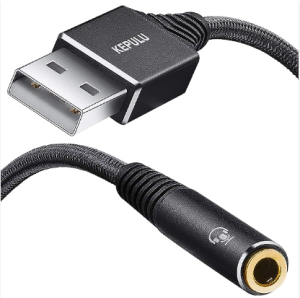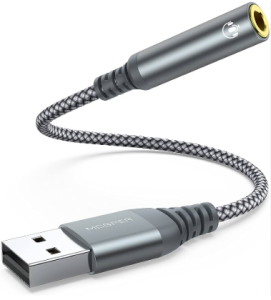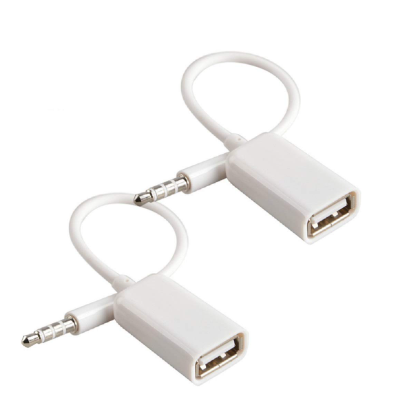USB To Aux Adapter
In a world where technology constantly evolves, the demand for efficient and versatile connectivity solutions remains ever-present. One such solution that has gained prominence is the USB to Aux adapter, a compact yet potent device that bridges the gap between different audio systems. Whether you’re an audiophile, a gadget enthusiast, or simply someone who wants to make the most of their devices, understanding the realm of USB to Aux adapters is essential. In this exploration, we delve into the intricacies of these adapters, highlighting the best options available and their potential to revolutionize your audio experience.
The Evolution of Connectivity: A Brief Overview
The evolution of audio connectivity has witnessed several milestones, from the analog era with traditional headphone jacks to the digital age of USB and Bluetooth connections. USB to Aux adapters emerged as a solution to connect devices with varying audio ports. An Aux (or auxiliary) port, often found in car stereos, home audio systems, and older gadgets, has been a staple for connecting headphones, speakers, and other audio devices. However, with the proliferation of USB-equipped devices, including smartphones, laptops, and tablets, a need arose for a bridge between the two worlds.
The Pinnacle of Versatility: Best USB to Aux Adapters
Anker USB-C to 3.5mm Audio Adapter: Anker, known for its high-quality accessories, offers a reliable USB-C to 3.5mm adapter. Its durable construction, coupled with noise reduction technology, ensures a clear and uninterrupted audio experience. This adapter is particularly valuable for users of modern smartphones lacking a headphone jack.
UGREEN USB to 3.5mm Audio Adapter: UGREEN presents a budget-friendly yet efficient solution for connecting USB devices to Aux ports. Its plug-and-play design and compatibility with a wide range of devices make it a popular choice. The adapter’s small form factor and compatibility with both Windows and macOS systems contribute to its versatility.

Creative Sound BlasterX G6 7.1 HD External Gaming DAC and USB Sound Card: Geared towards gaming enthusiasts and audio professionals, this adapter goes beyond basic connectivity. With support for high-resolution audio and virtual 7.1 surround sound, the Creative Sound BlasterX G6 elevates your audio experience. Its compatibility with consoles, PCs, and even smartphones enhances its appeal.
Apple USB-C to 3.5mm Headphone Jack Adapter: For Apple users who have transitioned to USB-C devices, this official adapter ensures seamless compatibility with their devices. Its compact design and ease of use make it an ideal companion for those wanting to continue using their existing 3.5mm headphones.
FiiO BTA30 High-Fidelity Bluetooth Transceiver and USB DAC: FiiO takes connectivity to the next level with its USB to Aux adapter that doubles as a Bluetooth transceiver and USB DAC. This feature-rich adapter supports high-fidelity audio formats and provides a wireless audio solution without compromising on quality.

iBosi Cheng USB-C to 3.5mm Adapter: This versatile adapter is designed for the latest USB-C devices, offering a straightforward way to connect to traditional Aux ports. Its compatibility with a variety of devices, including smartphones, tablets, and laptops, makes it a practical choice for users seeking a reliable audio connection.
The Buying Guide: Considerations and Features
When searching for the best USB to Aux adapter, several factors should guide your decision:
Compatibility: Ensure the adapter is compatible with your devices. Some adapters are tailored for specific operating systems or devices, while others offer broad compatibility.
Audio Quality: For audiophiles and music enthusiasts, audio quality is paramount. Look for adapters that support high-resolution audio formats and offer features like noise reduction and signal enhancement.
Durability: A well-constructed adapter can withstand regular use and the rigors of travel. Sturdy materials and quality craftsmanship contribute to the longevity of the device.
Additional Features: Some adapters come with extra features, such as Bluetooth connectivity, volume control, or customizable audio settings. Consider these features based on your specific needs.
Brand Reputation: Established brands often deliver better quality and customer support. Researching user reviews and expert opinions can help you gauge a brand’s reputation.
Price: USB to Aux adapters come in a range of prices. While budget-friendly options exist, investing a bit more in a reliable adapter can ensure a better overall experience.
A Guide to Choosing the Best USB to AUX Adapter: Making the Right Connection
In today’s tech-savvy world, the need for seamless audio connectivity is paramount. USB to AUX adapters play a crucial role in bridging the gap between older audio devices and modern gadgets. Whether you’re looking to connect your smartphone to your car’s stereo system or your laptop to external speakers, selecting the right USB to AUX adapter is essential. This guide will walk you through the key factors to consider when making your decision, ensuring you make the best choice for your audio needs.
Compatibility:
Before making a purchase, check the compatibility of the USB to AUX adapter with your devices. It should work effortlessly with a variety of gadgets such as smartphones, laptops, tablets, car stereos, and more. Look for adapters that support both USB-A and USB-C connections to cater to a wider range of devices.
Audio Quality:
The primary purpose of an adapter is to transmit audio signals accurately. Opt for an adapter that maintains high-quality sound output without distortion, noise, or signal loss. Look for features like gold-plated connectors and shielded cables, which can contribute to better audio fidelity.
Cable Length and Build Quality:
Consider the length of the adapter cable. A longer cable can offer more flexibility in setting up your audio connection, but it shouldn’t compromise signal quality. Additionally, prioritize adapters with durable construction and strain relief to prevent wear and tear over time.
Plug-and-Play vs. Additional Features:
Some USB to AUX adapters are simple plug-and-play devices, while others offer additional features like volume control, playback buttons, or noise cancellation. Choose based on your preferences and how you intend to use the adapter. For in-car use, features like playback controls can be particularly handy.
Brand Reputation and Reviews:
Research reputable brands with a history of producing reliable audio accessories. Read customer reviews and expert opinions to gauge the adapter’s performance, durability, and overall user experience. A well-regarded brand is more likely to deliver a high-quality product.
Price and Warranty:
Set a budget for your USB to AUX adapter, but avoid compromising quality for cost. Compare options within your price range and consider warranties that protect your investment. A longer warranty period can give you peace of mind regarding the adapter’s durability.
Versatility and Future-Proofing:
As technology evolves, so do audio connectivity standards. Choosing an adapter that supports multiple audio formats, such as MP3, WAV, and FLAC, can ensure compatibility with various devices and audio sources. Additionally, adapters with firmware updates can help you stay up-to-date with changing audio standards.
Conclusion
In the dynamic landscape of technology, USB to Aux adapters stand as bridges between the past and the present, connecting legacy audio systems with modern devices. Their versatility, convenience, and ability to enhance audio experiences make them indispensable tools for users across the spectrum. Whether you’re a gamer seeking immersive soundscapes, a music enthusiast craving high-fidelity audio, or simply someone who values seamless connectivity, the world of USB to Aux adapters has a solution tailored to your needs. As you embark on your quest for the perfect adapter, let your priorities guide you towards a device that harmonizes the past and present in a symphony of sound.
FAQs about the Best USB to AUX Adapters:
What is a USB to AUX adapter, and why might I need one?
A USB to AUX adapter is a device that allows you to connect a device with a USB output, such as a computer or smartphone, to a device with an AUX input, like car stereos or speakers. This adapter is useful when you want to play audio from a USB source through a device that only has an AUX input.
What features should I consider when looking for the best USB to AUX adapter?
When choosing the best USB to AUX adapter, consider factors like audio quality, compatibility with your devices, build quality, length of the cable (if applicable), and additional features such as noise cancellation or volume control. Make sure it supports the necessary USB and AUX standards for optimal performance.
Are there any compatibility issues I should be aware of when using a USB to AUX adapter?
Yes, compatibility can be an issue. Ensure that the adapter is compatible with your source device’s operating system and the device you’re connecting to, such as a car stereo or speaker. Some adapters may work better with specific devices or operating systems, so it’s essential to check compatibility before purchasing.
Do USB to AUX adapters affect audio quality?
The impact on audio quality can vary depending on the quality of the adapter. Lower-quality adapters might introduce static, interference, or reduced audio fidelity. The best USB to AUX adapters are designed to maintain good audio quality by using quality components and advanced signal processing techniques.
What are some highly recommended USB to AUX adapters available in the market?
As of my last update in September 2021, some popular USB to AUX adapters included the Anker USB-C to AUX Adapter, Apple USB-C to 3.5mm Headphone Jack Adapter, and the CableCreation USB to 3.5mm Audio Adapter. However, the market can change rapidly, so it’s a good idea to check the latest reviews and recommendations from reliable sources before making a purchase in 2023.
Remember that technology evolves quickly, so it’s wise to do some recent research and read user reviews before buying a USB to AUX adapter to ensure you’re getting the best product for your needs.
